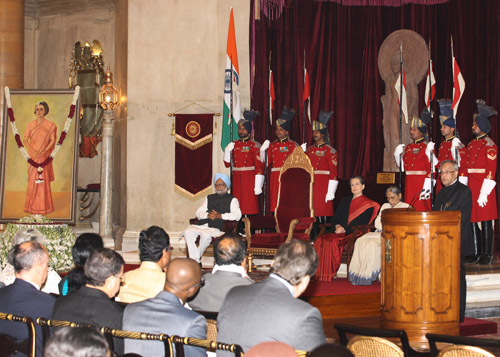
I consider it a great privilege to present the Indira Gandhi Prize for Peace, Disarmament and Development for the year 2011 to Ms. Ela Ramesh Bhatt whose exemplary work towards emancipation of poor rural women in India has become a model for making grass root democracy possible.
This prize, instituted in the name of our former Prime Minister, Late Shrimati Indira Gandhi, celebrates the values that she stood and fought for in the service of our nation and its people. She was a true leader of the people, who championed the cause of the poor and the deprived and who tirelessly pursued peace and universal disarmament for the betterment of human society. Every year, we recognize serious, creative efforts by individual or an entity for working towards the ideals that Shrimati Indira Gandhi embodied.
Shrimati Indira Gandhi believed that human beings have a collective destiny, and hence, it is their duty to work jointly to establish and maintain peace in the world. She adhered to a positive notion of peace that entailed a strong conviction to human welfare. Peace and development are intrinsically linked to one another. Unless progress touches all sections of society, peace will not only be fragile but also lead to tensions that result inevitably in dangerous manifestations.
Shrimati Gandhi was unflinching in her concern for the poor and the disadvantaged. The call for ‘Growth with Social Justice’ underlined her dedication to create systems and institutions to enable the benefits of development reach all sections of the society equitably.
Rural backwardness, can be addressed only through concerted efforts to create equality in access and unearth the potentialities hidden in people. Ms. Ela Bhatt’s work has underscored this approach to socio-economic upliftment.
Ms. Bhatt created the Self Employed Women’s Association (SEWA) in 1972, which has a membership in excess of 1.3 million. She also founded the SEWA Cooperative Bank in 1974, which has an outreach of 3 million women. These simple figures speak volumes of the dedicated efforts of Ms. Bhatt and her team in successfully bringing women out of poverty into a life of self-confidence and esteem.
If women are under represented in the productive efforts of our economy, it is not only injudicious but also detrimental to the cause of social progress. Due to the untiring efforts of Ms. Bhatt, SEWA has become an effective vehicle for promotion of self employment and self reliance amongst women. To realize these goals, the organization has been providing support services in the areas of savings and credit, health care, child care, legal aid, insurance, capacity building and communication. It has become a multi-dimensional entity - a labour collective, a co-operative and a women’s movement.
Ms. Bhatt’s work extends beyond the shores of the country. She is credited with playing an important role in the formation of several international initiatives aimed at collective progress through social mobilization. She has founded and chaired the Women’s World Banking, International Alliance of Home-based Workers, International Alliance of Street Vendors and a global network aimed at improving the status of poor working women, called ‘Women in Informal Employment: Globalizing, Organizing’.
Women comprise 48.5 per cent of our total population. Though the overall sex ratio has increased by 7 during the decade 2001 to 2011, the ratio of 940 females per 1000 male population in 2011 is disappointing figure and reflects the distance that remains in achieving true equality.
The literacy rate amongst women has increased from 53.7 per cent in 2001 to 65.5 per cent in 2011. However female literacy still lags behind male literacy by 16.7 per cent. Surveys have indicated that the female hourly wage rates in agriculture also vary from 50 to 75 per cent of the male wage rates.
The gender disparity in our country can be covered only through pro-active intervention in areas such as economic empowerment of women, building of adequate social and physical infrastructure and improving women’s role in governance. Empowerment of women is the key to not only meeting the objective of gender equality but also to elicit full participation from all our citizens in nation-building.
We must strengthen the systems and processes that facilitate women to take control and claim ownership of their lives. To lend true meaning to empowerment, we have to expand their freedom of choice. As poor women are often incapacitated to act individually, social mobilization for their economic redemption is a critical necessity.
Participatory institution building through self-help groups has been found to be one of the most effective tools for the empowerment of women in developing countries. As on 31st March 2012, there were around 63 lakh all-women self-help groups in India that had combined bank savings of more than Rs. 5,100 crore. The number of such self-help groups is increasing, with a growth rate of 9.2, 14.8 and 3.3 per cent during 2009-10, 2010-11 and 2011-12 respectively.
The micro-finance initiatives based on mutual or self-help method is conducive for women empowerment, as by emphasizing on group ownership, control and management and collective decision making, women also become prepared for participation in local governance structures. I am happy that India is a proud repository of such initiatives best exemplified by model organizations like SEWA.
Ms. Bhatt has been recognized both nationally and internationally for empowering women in our country and enabling them lead a life of dignity and independence. Ms. Bhatt’s life and work is truly reflective of the philosophy and ideals espoused by our Late Prime Minister, Shrimati Indira Gandhi. The prize bestowed upon Ms. Bhatt today is a tribute to her unflinching zeal towards the betterment of women in society and progress of humanity.
I am convinced that Ms. Bhatt’s example will spur many more initiatives in our country and elsewhere, aimed at renewal of society and all-round development of people. I urge SEWA to continue to expand the outstanding work it does aimed at promotion of entrepreneurship amongst poor women. I wish Ms. Bhatt and SEWA every success in her future efforts.
